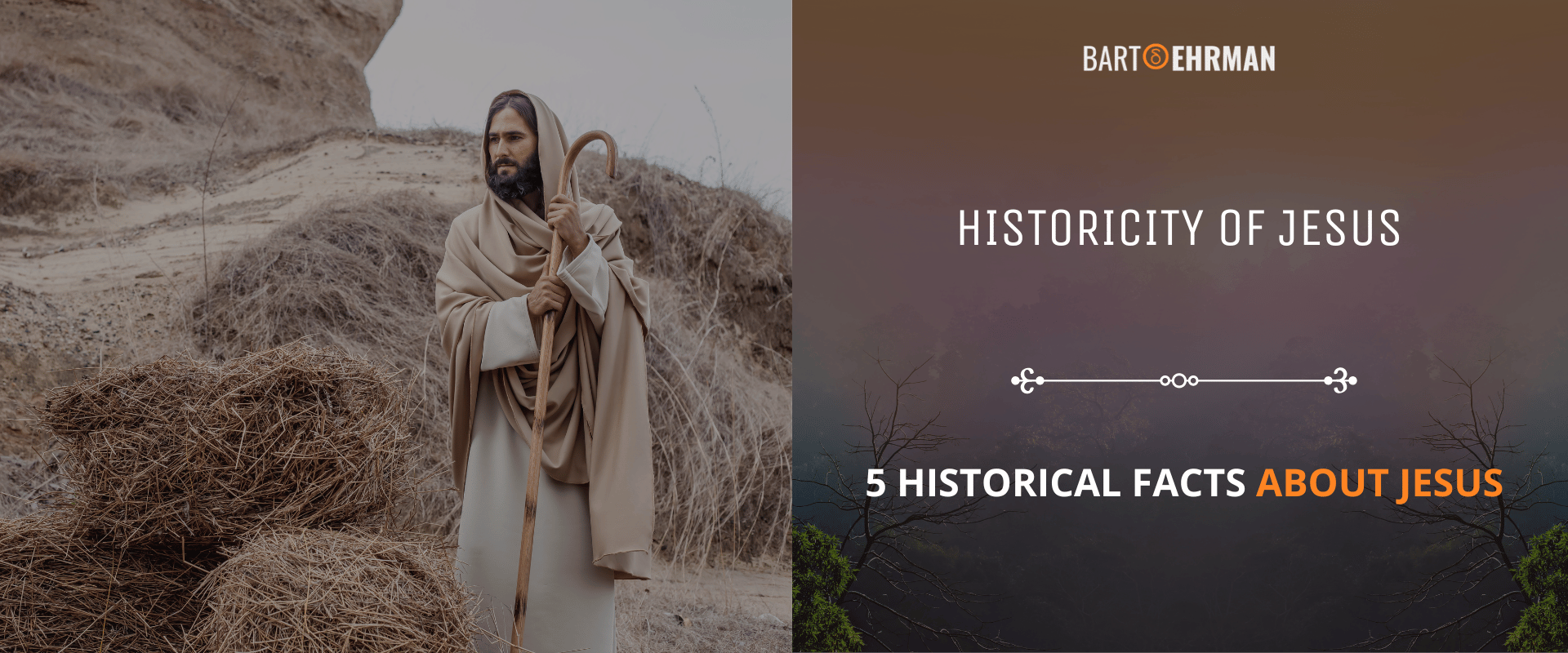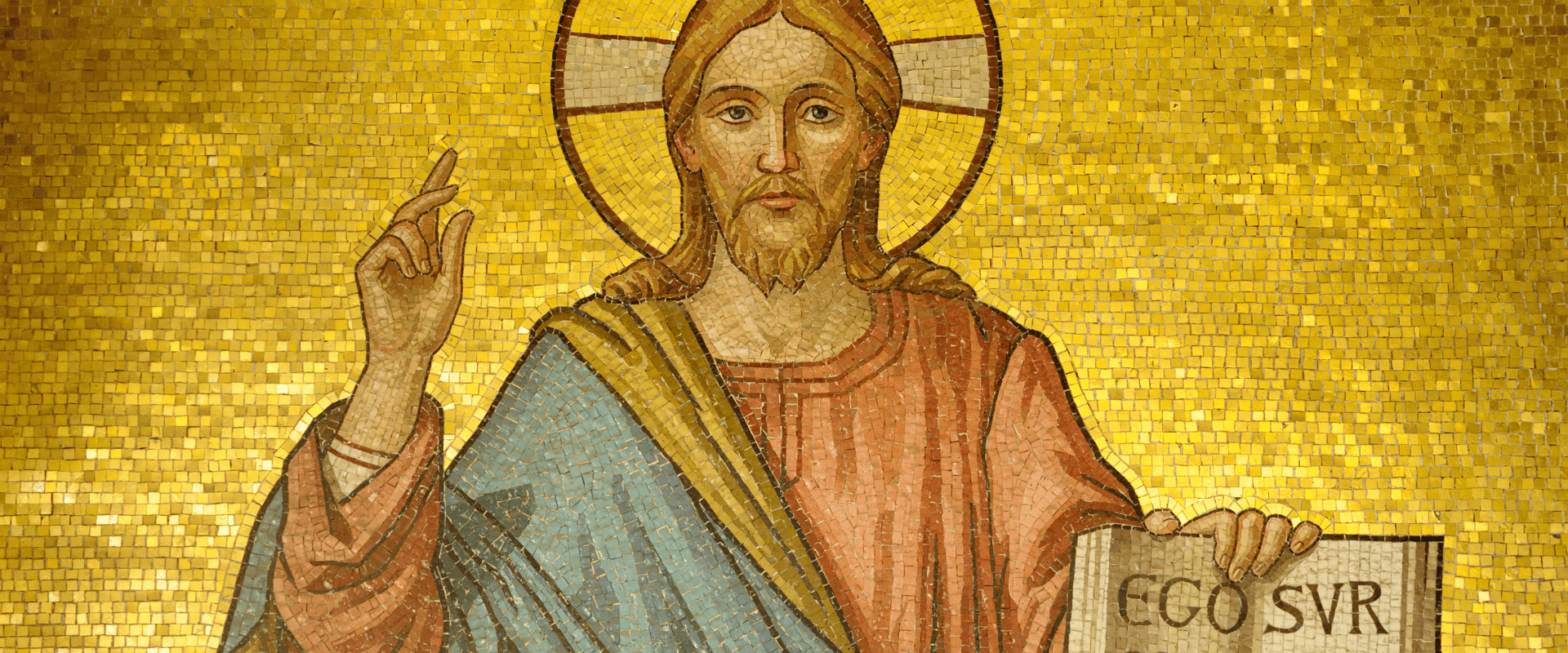Historicity of Jesus: 5 undeniable Facts that prove jesus was a real person

Written by Joshua Schachterle, Ph.D
Author | Professor | Scholar
Author | Professor | BE Contributor
Verified! See our editorial guidelines
Verified! See our guidelines
Date written: August 17th, 2023
Disclaimer: The views and opinions expressed in this article belong to the author and do not necessarily match my own. - Dr. Bart D. Ehrman
Some people doubt the historicity of Jesus. If Jesus was a real person, where is our proof?
Scholars certainly can’t provide historical evidence of Jesus’ resurrection or other faith claims. Most, however, are fairly certain that despite a lack of archeological evidence, Jesus did, in fact, exist. I want to address this question with five sources for historical facts about Jesus in this article.

1. unusual proof from THe Gospels
The books of the New Testament were not written as histories in the modern sense. The Gospels, for example, are written as theological treatises. While they did this through narratives, the Gospels were written 40 or more years after Jesus’ death. It is improbable that they could have accurately recorded all the details of Jesus’ story.
But that doesn’t mean they contain no historical information. In fact, historians have a good method to prove that they do!
In another article I wrote, I talked about a criterion historians use to verify the historicity of a written event. It’s called the criterion of embarrassment. This criterion suggests that a historical account is likely accurate if it contains embarrassing details about the author or subject. The Gospels provide two such examples.
Examples of the Criterion of Embarrassment
The first is Jesus’ baptism by John the Baptist. Why would this event be an embarrassment? Jesus was supposed to be superior to John the Baptist, yet John baptized him. The baptized one is in an inferior position, the baptizer being understood as the leader.
The Gospels explain this away in several ways. However, the story is so well-known they must include it despite its implications for Jesus’ status. This makes it very likely that it actually happened.
The other event all the Gospels include is the crucifixion. When the Gospels were written decades after Jesus’ death, Christians had long interpreted the crucifixion as necessary. However, crucifixion was also the most humiliating punishment possible. The whole idea was to put offenders on display, in all their agony, to deter future offenders.
For followers of Jesus, his crucifixion, the ultimate form of capital punishment, would initially have been shameful. This is the reason the crucifixion meets the criterion of embarrassment. No followers of Jesus would invent this type of death for their leader.
These two facts make Jesus’ historicity highly likely.
2. Paul’s Letter to the Galatians
Paul wrote a letter to the community he established in Galatia in the late 40s or early 50s CE. This is only 10 to 20 years after Jesus’ death, although he’s writing about earlier events. Based on Paul’s words, scholars estimate that he became a Jesus follower about 3-7 years after Jesus’s death.
Paul talks about his conversion and what he did afterward in Galatians 1:18-19:
Then after three years, I went to Jerusalem to visit Cephas [Peter] and stayed with him for fifteen days, but I did not see any other apostle except James the Lord’s brother.
Did you catch that last part? Paul met “James the Lord’s brother,” one of Jesus’ actual siblings and a leader in the Christian community in Jerusalem, during his visit to Peter. If Jesus never existed, he couldn’t have had a brother.
3. Tacitus & Nero's Response
Tacitus was a Roman historian. Writing in the early 2nd century CE, he tells us about the persecution of some Christians. An enormous fire broke out in Rome in 64 CE, and the emperor Nero was suspected of starting it. Tacitus describes Nero’s response this way:
Therefore, to put down the rumor, Nero substituted as culprits and punished in the most unusual ways those hated for their shameful acts … whom the crowd called “Chrestians.” The founder of this name, Chrestus, had been executed in the reign of Tiberius by the procurator Pontius Pilate.
Tacitus spells “Christ” differently, but there is no doubt that he’s talking about Jesus. Scholars Paul Eddy and Gregory Boyd argue this passage gives us historical confirmation of Jesus’ crucifixion.
If Jesus was a real person, these are exactly the sort of references you’d expect to find in history. Tacitus, and indeed many others, knew about the crucifixion of Jesus. This, of course, means that Jesus likely did exist.
4. Pliny the Younger
Pliny the Younger was the governor of Bithynia and Pontus in Anatolia (modern-day Turkey). In 112 CE, he wrote a letter to the emperor Trajan about his problem with Christians. Should he punish them if they refuse to recant Christianity and sacrifice to the Roman gods? Here is what Pliny says about Christian worship practices based on what Christians told him:
[T]hey met on a stated day before it was light, and addressed a form of prayer to Christ, as to a divinity, binding themselves by a solemn oath, not for the purpose of any wicked design, but never to commit any fraud, theft, or adultery, never to falsify their word, nor deny a trust when they should be called upon to deliver it up; after which it was their custom to separate, and then reassemble, to eat in common a harmless meal.
Pliny finds it strange that Christians pray to Christ. This is probably because he knows of Christ as a real person. The Christians may think he’s divine, but Pliny knows who Jesus was and likely knows he was crucified.

5. Josephus, THE ANTIQUITIES OF THE JEWS
In his book The Antiquities of the Jews, the Jewish historian Josephus writes about Jesus in about 95 CE. However, parts of this writing may not be his own:
Around this time, there lived Jesus, a wise man, if indeed one ought to call him a man. He did surprising deeds, and a teacher of such people accepted the truth gladly. He won over many Jews and many of the Greeks. He was the Messiah. When Pilate, upon hearing him accused by men of the highest standing among us, had condemned him to be crucified, those who in the first place came to love him did not give up their affection for him, for on the third day, he appeared to them restored to life. The prophets of God had prophesied this and countless other marvelous things about him. And the tribe of Christians, so called after him, have still to this day not died out.
Scholarly Thoughts: HISTORICITY OF JESUS
Most scholars agree that a later Christian scribe inserted Christian rhetoric into this passage. When those suspect phrases are taken out, the passage looks like this:
Around this time, there lived Jesus, a wise man. He did surprising deeds, and a teacher of such people accepted the truth gladly. He won over many Jews and many of the Greeks. When Pilate, upon hearing him accused by men of the highest standing among us, had condemned him to be crucified, those who in the first place came to love him did not give up their affection for him. And the tribe of Christians, so called after him, have still to this day not died out.
Josephus knows that Jesus existed, that he was considered a wonder-worker, and was crucified. He also knows that those who loved Jesus during his lifetime continue to love him long after his death. All of this points to Jesus as a real person.
WAS JESUS A REAL PERSON?
Some people ask not only if Jesus existed but if he was a "real person." I think the distinction is they want to know if he was flesh and blood like us. Obviously, there are two sides to this answer... the historical and the theological sides.
From a historical perspective, Jesus of Nazareth is widely considered to have been a real person, a human like you or I, who lived in the 1st century CE in the region that is now modern-day Israel and Palestine. He was a Jewish preacher and healer who had a significant following and was eventually crucified by the Roman authorities. Most historians agree that Jesus was a human being who lived in a specific time and place, although the details of his life are often debated and are sometimes drawn from religious texts, which can introduce theological views into the historical account.
Theological perspectives on Jesus' humanity are diverse and often tied to religious beliefs. In traditional Christian theology, Jesus is considered to be both fully divine and fully human, a doctrine known as the Hypostatic Union. According to this belief, Jesus was God incarnate but also experienced human emotions, needs, and limitations. However, different Christian denominations and other religious traditions interpret Jesus's nature in various ways.
Conclusion: Proof that Jesus Existed
The historicity of Jesus – no historical evidence exists for Jesus’ resurrection, miracles, or ascension. These are faith claims, something that historians are not equipped to verify.
However, we do have both Christian and non-Christian textual sources for Jesus’ existence as a real person. Although there is no archeological proof of his life, there is ample historical evidence of Jesus in written sources.
Based on these references, most scholars believe in the historicity of Jesus.

